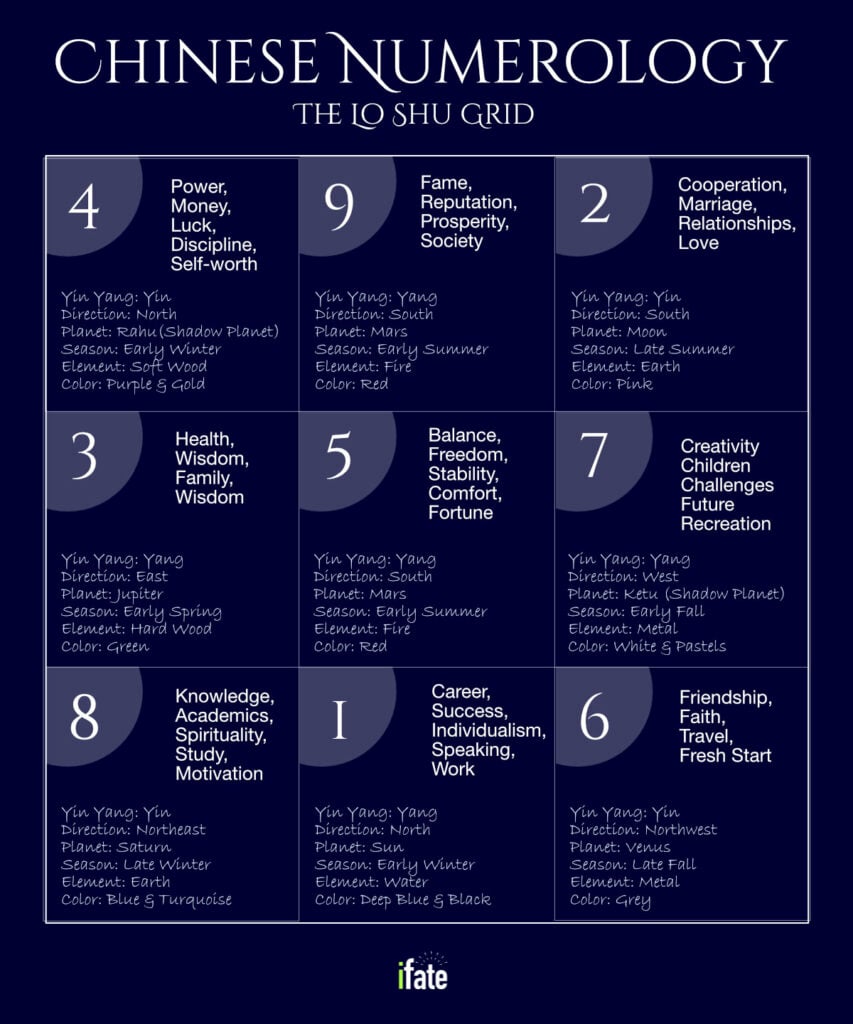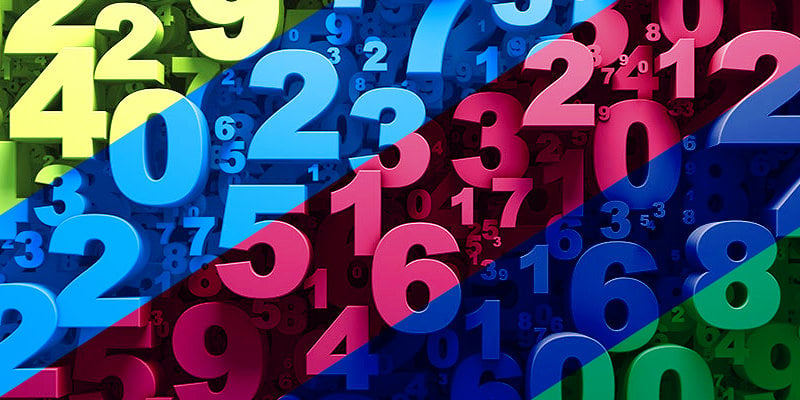Complex and colorful theories about the mystical properties of numbers were ubiquitous across the ancient world. From Babylon and Egypt, to ancient Japan, China, India and Greece, numbers weren’t just mathematical concepts. For the ancients, numbers were mystical things.
As humankind’s understanding of mathematics grew, so did our fascination with the esoteric properties of numbers. Over the course of history, these numerological beliefs came to have profound effects on art, architecture and even politics. An understanding of how numerology influenced people and events was an important part of everything from urban planning and design to making government policy and going to war.
When comparing different ancient cultures however, the differences between their numerological belief-systems are stark: Numerology in one culture often had little to do with the belief systems of another.
As the centuries passed, many systems were forgotten. Others merged, or borrowed ideas from one another.
Of the hundreds of different historical variations, 5 principal systems of numerology survive to this day. They are:
- Chaldean Numerology
- Kabbalistic Numerology
- Chinese Numerology
- Tamil Numerology
- Pythagorean Numerology
NOTE: The free numerology readings available on the iFate site are rooted in Pythagorean numerology, which is often referred to as “Western numerology“. It is the most prevalent numerological system used in the West today.
You could study each one of those systems for a year, and still only scratch the surface, so a detailed explanation of each system is beyond the scope of this post.
Here’s a quick overview of what makes each of the above systems special:
Chaldean Numerology
The ancient Chaldeans lived in Mesopotamia around the 10th century BC. Mostly known for their language, Aramaic, the Chaldeans were also responsible for one of the oldest systems of numerology. Chaldean numerology is important, not only because it survives to this day, but because it influenced so many later systems of numerology.
Like most numerological systems, Chaldean numerology assigns different energies and properties to numbers and letters, but what is most notable about the Chaldean system is that it does not include the number 9. Why? Because the number 9 was considered sacred to the Chaldeans. No numerological analysis could be performed using 9.
For example: When performing numerological reduction with Chaldean numerology, the number 18 cannot be reduced further.
Here’s how letters are converted into numbers under Chaldean numerology:
| Chaldean Numerology Value | Associated letters |
|---|---|
| 1 | A, I, J, Q, Y |
| 2 | B, K, R |
| 3 | C, G, L, S |
| 4 | D, M, T |
| 5 | E, H, N, X |
| 6 | U, V, W |
| 7 | O, Z |
| 8 | F, P |
Kabbalistic Numerology
Kabbalistic Numerology is one of the most popular forms of numerology today. It comes from the ancient Hebrew mystical texts of the Kabbalah. According to Jewish mysticism, only a person’s name matters for a numerology reading. Unlike Western or Pythagorean numerology, our date of birth is not relevant to determining a numerological profile.
The numerical values of letters in Kabbalah numerology are related to their position within the Hebrew alphabet, and are assigned according to the following table:
| Kabbalah Numerology Value | Associated letters |
|---|---|
| 1 | A,J,S |
| 2 | B, K, T |
| 3 | C,L,U |
| 4 | D,M,V |
| 5 | E,N,W |
| 6 | F,O,X |
| 7 | G,P,Y |
| 8 | H,Q,Z |
| 9 | I,R |
According to the Kabbalah, a person’s full name must be used, including their middle and last names. The Kabbalistic system involves adding up the values of each letter in the name. Instead of reducing the number by repeatedly adding those digits together, Kabbalistic numerologists divide the sum by the number 9.
After dividing by the number 9, you’ll likely have a remainder. If not, use the number 0 as the remainder. In either case, the final step is to add the number 1 to the remainder, and that’s your final number.
That final number is then interpreted according to the following list:
- 1: Leaders and winners
- 2: Growth and magnification
- 3: Love and empathy
- 4: Misfortune
- 5: Creation and creativity
- 6: Fulfillment and mastery
- 7: Magic and psychic ability
- 8: Impulsiveness
- 9: Fortune and success
Chinese Numerology
Chinese numerology (Also called “Lo Shu numerology”) is a 4,000 year old numerological system based on the concept of a “magic square”. A magic square is a grid of numbers in which every column and every row all add up to the same amount. In this case, the magic square used in Lo Shu numerology has columns and rows which add up to the number 15.
The diagram below shows the classic Lo Shu square of Chinese numerology. Each number is associated with several personality traits and life goals. Every number also has additional associations with either “Yin” (feminine) or the “Yang” (male) energy), a ruling planet, a compass-direction, a classical element and a color.
The Lo Shu Magic Square

The Lo Shu Grid is the basis of Chinese Numerology
Reading the Lo Shu Grid
Unlike most other numerological systems, numerology readings using the Lo Shu square doesn’t involve numerological reduction. Instead, each individual digit in a birthday is separated. So for example, the date October 2, 1969 (10 / 2 / 1969) would be broken down into two 1’s, one 2, one 6, and two 9’s. Zeros are ignored. These numbers are placed onto the grid. Each square that is “filled” by a number, is part of that person’s personality or life-path. Squares with 2 or more numbers in them, are particularly strong. Squares with no numbers in them, are considered traits that are lacking.
Vedic Numerology
Vedic numerology (also called “Indian numerology” or “Tamil numerology”) is an ancient South Asian approach to numerological readings. In Vedic numerology, each number is associated with both astrological planets (according to Vedic Astrology, which differs from Western Astrology) and with the classical gods of the Hindu religion.
As with Chaldean numerology, there is no meaning associated with the sacred number 9. The number 10, therefore, cannot be reduced. Vedic astrology also has unique interpretations for all 2 digit numbers from 10 to 99.
Here are the number assignments for all letters according to Vedic astrology.
| Vedic Numerology Value (1-8) | Associated letters |
|---|---|
| 1 | A, I, J, Q, Y |
| 2 | B, K, R |
| 3 | C, G, L, S |
| 4 | D, M, T |
| 5 | E, H, N, X |
| 6 | U, V, W |
| 7 | O, Z |
| 8 | F, P |
Western Numerology
Western numerology, also called “Pythagorean numerology” is the most well-known numerological system in Europe and the USA today. While attributed to the Greek philosopher and mathematician Pythagoras, the system has roots in both of the far older Kabbalistic and Chaldean systems. Western numerology uses a system of numerological reduction to analyze any name or number — including personal names, family names, birthdates and addresses.
According to Western or Pythagorean Numerology, numbers are assigned as follows:
| Pythagorean Numerology Value | Associated letters |
|---|---|
| Number 1 | A,J,S |
| Number 2 | B, K, T |
| Number 3 | C,L,U |
| Number 4 | D,M,V |
| Number 5 | E,N,W |
| Number 6 | F,O,X |
| Number 7 | G,P,Y |
| Number 8 | H,Q,Z |
| Number 9 | I,R |
In modern Western numerology there are also 3 special reserved numbers which cannot be reduced. These special “Master Numbers” are 11, 22 and 33.
iFate’s free numerology reports use the above Western numerological system.
There’s no “right” way to practice numerology. Each of the above systems has thousands of years of history behind it, and millions of fans.
If you’re an English speaker, and you’re living in the West, the chances are the term “numerology” will probably mean Western / Pythagorean numerology for you. But that doesn’t mean you can’t explore the above systems to see if one of them more accurately describes your personality and the world around you.



